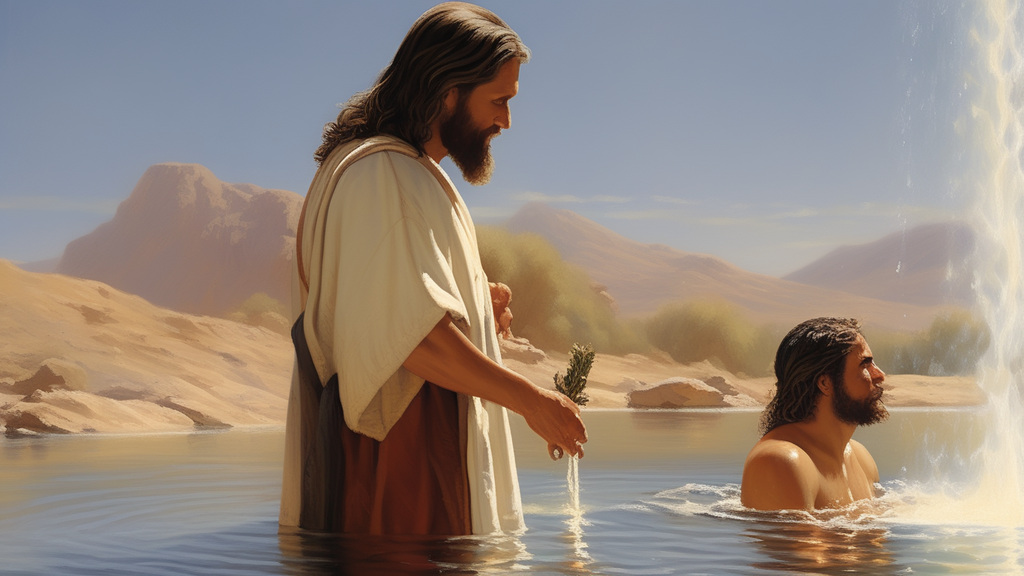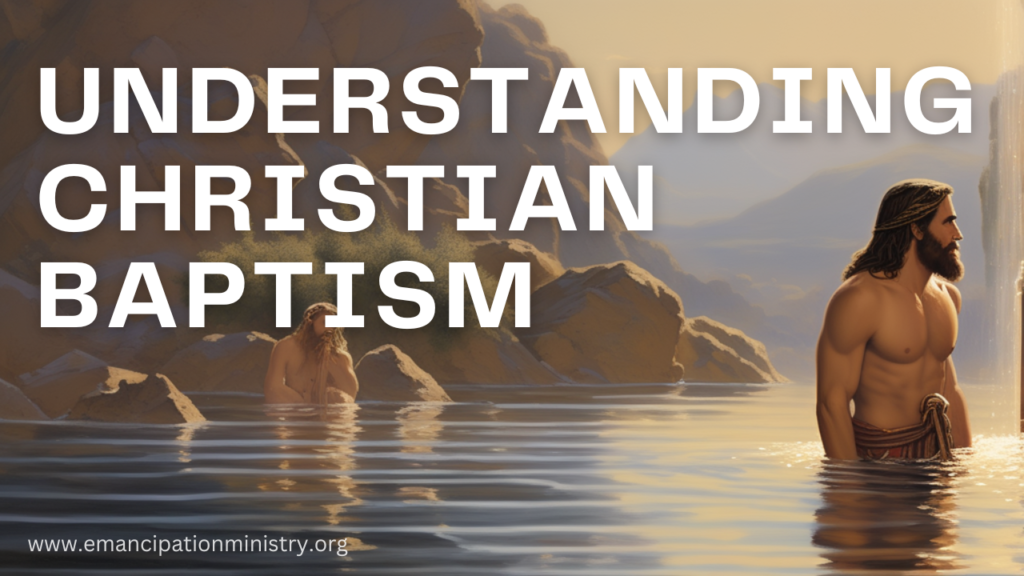Contents
- 1 Christian Baptism
- 1.0.1 The Profound Symbolism of Baptism:
- 1.0.2 Cleansing and Purification:
- 1.0.3 Incorporation into the Body of Christ:
- 1.0.4 Apollos and the Journey of Understanding:
- 1.0.5 The Role of Baptism in Discipleship:
- 1.0.6 Living Out the Baptismal Identity:
- 1.0.7 Engaging in Ongoing Spiritual Formation:
- 1.0.8 Challenges to a Holistic Understanding of Baptism:
- 1.0.9 Denominational Differences:
- 1.0.10 Guiding Believers into a Deeper Understanding:
- 1.0.11 Interactive Study Groups:
- 1.0.12 Integration of Baptismal Theology in Worship:
- 1.0.13 Conclusion:
Christian Baptism
Embarking on a spiritual journey through the sacred waters of Christian baptism is a transformative experience that goes beyond a mere ceremonial act. In this exploration, we delve into the depths of baptism, uncovering its multifaceted symbolism and examining the challenges and triumphs of understanding this sacrament within the contemporary Christian context.
spiritual trip: a journey that connects believers to our Lord and Saviour’s life, death, and resurrection. As we examine the many facets of baptism, it becomes clear that this sacrament is more than just a ceremonial act; rather, it is a life-changing event that encompasses the believer’s identity, commitment, and communion with the Triune God.
The Profound Symbolism of Baptism:
Deep symbolism permeates Christian baptism, with each component adding to the depth of its significance. Let’s examine the multiple levels of meaning that contribute to this sacrament being a crucial event in a believer’s life.

Identification with Christ: Christian baptism serves as a powerful declaration of identification with the life, death, and resurrection of Jesus Christ. In the act of immersion, believers symbolically share in Christ’s burial and rise to the newness of life. Romans 6:4 (NIV): “We were therefore buried with him through baptism into death in order that, just as Christ was raised from the dead through the glory of the Father, we too may live a new life.” This imagery vividly portrays the believer’s participation in the redemptive work of Christ, experiencing spiritual rebirth and the forgiveness of sins.
Cleansing and Purification:
The water of baptism serves as a symbol of cleansing and purification. In the same way physical water cleanses the body, the spiritual act of baptism symbolizes the cleansing of the soul from sin. Acts 22:16 (NIV): “And now what are you waiting for? Get up, be baptized and wash your sins away, calling on his name.” The immersion in water represents the washing away of sins, allowing the believer to emerge spiritually renewed and justified before God.
Incorporation into the Body of Christ:
Christian baptism marks the entry of an individual into the larger body of Christ—the community of believers. It signifies the unity of believers under the lordship of Jesus Christ and their commitment to communal worship, discipleship, and mutual support. 1 Corinthians 12:13 (NIV): “For we were all baptized by one Spirit so as to form one body—whether Jews or Gentiles, slave or free—and we were all given the one Spirit to drink.” Baptism, therefore, becomes a unifying force, transcending cultural, social, and ethnic boundaries within the body of Christ.
Apollos and the Journey of Understanding:

Going back to the story of Apollos, we see a process of spiritual development—a progression from a limited comprehension of Christian baptism to a thorough grasp of it. Apollos was a passionate teacher, but at first he only knew of John’s baptism; thus, his viewpoint was narrow. But under the direction of Aquila and Priscilla, he accepted a more comprehensive understanding and brought his views into line with the apostles’ teachings. This understanding process is representative of many believers’ wider experiences. Some people may come to Christian teachings with a limited comprehension or lack of knowledge at first. But as they interact with God’s Word, hang out with more seasoned Christians, and allow the Holy Spirit to lead, their understanding grows, and they feel a stronger bond with the core principles of Christianity.
The Role of Baptism in Discipleship:
Christian baptism is a crucial stage in the discipleship process, not a one-time occurrence. It initiates a process of growth, change, and conformity to the image of Christ that lasts a lifetime. The meaning of a believer’s baptism develops over time as they follow the road of discipleship; it shapes their identity, perspective, and relationships with the outside world.
Living Out the Baptismal Identity:
Baptismal vows extend beyond the immersion in water; they encompass a commitment to live out the implications of that identity daily. The baptized believer is called to embody the principles of love, humility, and servanthood modelled by Jesus. Galatians 2:20 (NIV): “I have been crucified with Christ, and I no longer live, but Christ lives in me. The life I now live in the body, I live by faith in the Son of God, who loved me and gave himself for me.” This verse underscores the transformative nature of baptism, emphasizing the believer’s union with Christ and the subsequent outworking of this identity in daily living.
Engaging in Ongoing Spiritual Formation:

Discipline involves a continuous process of spiritual formation and growth. Baptized believers are encouraged to deepen their understanding of the Scriptures, engage in prayer and worship, and cultivate a vibrant relationship with God through the Holy Spirit. Colossians 2:6-7 (NIV): “So then, just as you received Christ Jesus as Lord, continue to live your lives in him, rooted and built up in him, strengthened in the faith as you were taught, and overflowing with thankfulness.” This passage underscores the call for believers to remain rooted in Christ, drawing sustenance from the life-giving source of their faith.
Challenges to a Holistic Understanding of Baptism:
Although the biblical story offers a thorough perspective on baptism, there are a number of obstacles that can stand in the way of a comprehensive understanding in the context of the modern Christian world. To promote a greater understanding of the sacrament, the church must address these issues. Ritualization without Understanding: In some cases, baptism may become a ritualized practice devoid of the profound spiritual understanding it signifies. Believers may undergo baptism without grasping its significance, diminishing the transformative power inherent in the sacrament. Acts 19:2–3 (NIV): “So Paul asked, ‘Then what baptism did you receive?’ ‘John’s baptism,’ they replied. Paul said, ‘John’s baptism was a baptism of repentance. He told the people to believe in the one coming after him, that is, in Jesus.'” The encounter in Ephesus highlights the need for believers to move beyond ritualistic practices and embrace a more profound understanding of Christian baptism.
Denominational Differences:
Denominational distinctions and theological nuances surrounding baptism can sometimes create confusion among believers. Disparities in beliefs about the mode of baptism, its timing, and its efficacy may contribute to a fragmented understanding within the larger body of Christ. 1 Corinthians 1:10 (NIV): “I appeal to you, brothers and sisters, in the name of our Lord Jesus Christ, that all of you agree with one another in what you say and that there be no divisions among you, but that you be perfectly united in mind and thought.” This scripture underscores the biblical call for unity among believers, encouraging a shared understanding of foundational doctrines, including baptism.
Guiding Believers into a Deeper Understanding:
It is the duty of the church, its leaders, and mature disciples in the community to bring believers into a deeper understanding of baptism. The following doable actions can help promote a deeper understanding of this sacrament:
Pastoral Teaching and Discipleship: Pastors and church leaders play a crucial role in providing clear, biblically grounded teaching on baptism. Regular sermons, Bible studies, and discipleship programs can offer opportunities for believers to explore the depths of this sacrament. Ephesians 4:11–13 (NIV): “So Christ himself gave the apostles, the prophets, the evangelists, the pastors, and the teachers to equip his people for works of service, so that the body of Christ may be built up until we all reach unity in the faith and in the knowledge of the Son of God and become mature, attaining to the whole measure of the fullness of Christ.” Pastors are called to equip believers for maturity, and this includes providing a robust theological foundation for the practice of baptism.
Interactive Study Groups:

Small group settings, where believers can engage in interactive discussions, are invaluable for deepening their understanding of baptism. Through shared exploration of relevant scriptures and theological concepts, participants can glean insights from one another’s perspectives. Proverbs 27:17 (NIV): “As iron sharpens iron, so one person sharpens another.” Interactive study groups create an environment where believers can sharpen their understanding of baptism through mutual encouragement and shared insights.
Integration of Baptismal Theology in Worship:
Worship services can be intentionally designed to reinforce the theological underpinnings of baptism. The inclusion of relevant hymns, prayers, and visual elements can enhance the worshiper’s connection to the sacrament. Psalm 95:6 (NIV): “Come, let us bow down in worship; let us kneel before the Lord our Maker.” The act of worship becomes a transformative experience when it is intentionally aligned with the theological truths encapsulated in Christian baptism.
Conclusion:
In conclusion, Christians are encouraged to go out on an ongoing quest for more profound spiritual understanding by studying Apollo’s journey and the larger context of Christian baptism. During the course of a believer’s journey with Christ, baptism is a dynamic and changing experience rather than a static event. As we traverse the difficulties and subtleties associated with the Church’s concept of baptism, let us not waver in our dedication to biblical truth, unity, and the development of disciples.
May the waters of baptism always represent not only a singular experience but also a continuous path of spiritual development, relationship with God, and involvement in the atoning work of Jesus Christ. This lengthy analysis of the meaning of baptism should act as a spark for more research, discussion, and a rekindled desire to comprehend the nuances of this sacrament in the framework of our Christian faith. Find out who was baptized twice in the Bible. You can also watch our sermons on YouTube.
Christian Baptism, Christian Baptism, Christian Baptism, Christian Baptism, Christian Baptism, Christian Baptism


I simply could not leave your website without expressing how much I appreciated the quality of the information you provided to your visitors. I anticipate returning frequently to read new postings.
Thank you! And remain blessed.